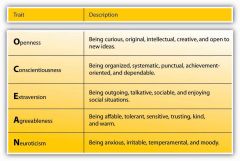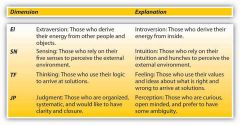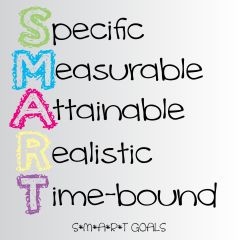![]()
![]()
![]()
Use LEFT and RIGHT arrow keys to navigate between flashcards;
Use UP and DOWN arrow keys to flip the card;
H to show hint;
A reads text to speech;
55 Cards in this Set
- Front
- Back
|
Person Organization Fit |
Person's values, personality, goals, that determine a persons fit for a job |
|
|
Person Job Fit |
Person's skill knowledge, and other abilities determine fit for job |
|
|
Values |
Stable life goals |
|
|
Terminal Values |
End states of life people desire ex. successful career, world peace, etc. |
|
|
Instrumental Values |
Acceptable modes of conduct or traits |
|
|
Personality |
Encompasses the relatively stable feelings, thoughts, and behavioral patterns a person has |
|
|
Big Five |

|
|
|
Extraversion |
How a person "re-charges" degree of socialness |
|
|
Myers Briggs Type Indicator |

|
|
|
Positive and Negative Affective |
Positive= More positive moods
Negative= more negative moods |
|
|
Negative Person Tips |
1. Understand that you are unlikely to change the person
2. Keep an open mind
3. Set a limit on conversations with that person
4. Try to get them to change the situation |
|
|
Self-Monitoring |
Degree to which a person is able to monitor his/her actions and appearance in social situations
Problems: High Stress Less accurate feedback Less Committed |
|
|
Proactive Personality |
Person's inclination to fix what is received as wrong, take action quicker |
|
|
Self Esteem |
Degree about positive feelings of self |
|
|
Self Efficacy |
Belief that one can perform a specific task sucessfully |
|
|
Internal Locus of Control |
Can control own destiny |
|
|
External Locus of Control |
Things happen because of outside factors |
|
|
Perception |
Process by which individuals detect and interpret environmental stimuli |
|
|
Self-Enhancement Bias |
Overestimate our performance and capabillities |
|
|
Self-Effacement Bias |
Underestimate performance and capabilities |
|
|
False Consensus Error |
Overestimate how similar we are to other people |
|
|
Stereotypes |
Generalizations based on group characteristics |
|
|
Self Fulfilling Prophecy |
Making stereotypes happen through your own actions |
|
|
Selective Perception |
Paying attention to parts of the environment while ignoring other parts |
|
|
Three factors of external and internal attributions |
Consensus: Do other people behave the same way?
Distinctiveness: Does this person behave the same way across different situations?
Consistency: Does this person behave the same way in different occasions in the same situation? |
|
|
Self-Serving Bias |
Attributing our failure to the situation, not ourselves |
|
|
Job Satisfaction |
The feelings people have towards their jobs |
|
|
Organizational Commitment |
Emotional attachment people have towards a company they work for |
|
|
Attitude |
Our opinions, beliefs, and feelings about aspects of our environment |
|
|
Attitude Surveys |
Given periodically to track work attitudes |
|
|
Exit Interview |
Meeting with a departing employee |
|
|
Psychological Contract Breach |
Violation of an unwritten understanding b/w the employee and the organization regarding expectations |
|
|
Organizational Citizenship behavior |
Voluntary behaviors employees perform to help others and benefit the organization |
|
|
Hygiene Factors |
Company policies, supervision, working conditions, salary, safety, and security on the job |
|
|
Distributive Justice |
The degree to which outcomes received from the organization are fair |
|
|
Extinction |
Removal of rewards following negative behavior |
|
|
Ob Mod |

|
|
|
Procedural Justice |
Degree to which fair decision making procedures are used to arrive at a decision |
|
|
Benevolents vs Entitleds |
Benevolents- Don't expect much in return
Entitleds- Expect a lot w/o much in return |
|
|
Equity Sensitivity |
Explains different reactions to inequity |
|
|
Expectancy |
Whether the person believes that high levels of effort will lead to outcomes of interest such as performance or success |
|
|
Valence |
Value of the rewards awaiting the person as a result of performance |
|
|
Referent |
Person we compare ourselves to in equity theory |
|
|
Instrumentality |
The degree to which the person believes that performance is related to secondary outcomes such as rewards |
|
|
Job Characteristics Model |

|
|
|
Skill Variety |
Extent to which the job requires a person to utilize multiple high level skills |
|
|
Task Identity |
Degree to which a person is in charge of completing an identifiable piece of work from start to finish |
|
|
Task Significance |
refers to whether a person's job substantially affects other people's work |
|
|
Autonomy |
Degree to which a person has freedom to decide how to perform his/her tasks |
|
|
Empowerment |
Removal of conditions that make a person powerless |
|
|
Structural Empowerment |
Refers to the aspects of the work environment that give employees discretion, autonomy, and the ability to do their jobs effectively |
|
|
Goal Commitment |
Degree to which a person is dedicated to reaching the goal |
|
|
Smart Goal |

|
|
|
360 Degree Feedback |
System where feedback is gathered from supervisors, peers, subordinates, and even customers |
|
|
3 Important Key Factors of Performance Appraisal |
Adequate Notice- Revealing criteria to employees
Fair Hearing- Two way communication, hear employee side
??
|

